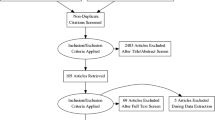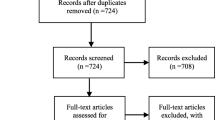Abstract
Background
Frailty and delirium are important conditions in an ageing population, but there is little evidence exploring medical students’ conceptualisation of, or attitudes towards these subjects. We investigated how students’ concepts of frailty and delirium changed following a new geriatric medicine module at Manchester medical school.
Materials and methods
Semi-structured interviews were used with students before and after the new teaching week to explore changes in attitude towards frailty and delirium and their conceptualisation. Final year students who had not completed the module were interviewed as a comparison group. Grounded theory and content clouds were employed for data analysis.
Results
Ten 4th year and 11 final year students were interviewed. After the teaching week, 4th year students had a richer conceptualisation of frailty and delirium. Students described structured assessments such as comprehensive geriatric assessment and expressed confidence in their use. Their frameworks were more developed than the final year students who had not had such teaching. Attitudes towards older people, frailty, delirium, and the specialty of geriatric medicine improved following the teaching week.
Conclusion
This study shows that geriatric medicine teaching improves students’ conceptualisation of frailty and delirium and their understanding of the importance of structured assessments and management plans.



Similar content being viewed by others
Abbreviations
- CAM:
-
Confusion assessment method
- CGA:
-
Comprehensive geriatric assessment
- GT:
-
Grounded theory
- P:
-
Participant
- Y4:
-
Year 4
- Y5:
-
Year 5
- Y4-Pre:
-
Year 4 participant interview before the teaching week
- Y4-Post:
-
Year 4 participant interview after the teaching week
- Y5-Pre:
-
Year 5 participant interview before the teaching week
- Y5-Post:
-
Year 5 participant interview after the teaching week
- 4AT:
-
Rapid assessment test for delirium
References
Clegg A, Young J, Iliffe S, Rikkert MO, Rockwood K (2013) Frailty in elderly people. Lancet 381(9868):752–762
Roland M, Paddison C (2013) Better management of patients with multimorbidity. BMJ 346:f2510
British Geriatric Society (2014) Fit for frailty. http://www.bgs.org.uk/campaigns/fff/fff_full.pdf. Accessed 14 Dec 2017
Charmaz K (2007) Qualitative psychology: a practical guide to research methods. SAGE Publications, London, pp 81–110
McNaught C, Lam P (2010) Using Wordle as a Supplementary Research Tool. Qual Rep 15(3):630–643. http://nsuworks.nova.edu/tqr/vol15/iss3/8
Cidell J (2010) Content clouds as exploratory qualitative data analysis. Area 42(4):514–523
Davis D, MacLullich A (2009) Understanding barriers to delirium care: a multicentre survey of knowledge and attitudes amongst UK junior doctors. Age Ageing 38(5):559–563
Jenkin RPL, Al-Attar A, Richardson S, Myint PK, MacLullich AMJ, Davis DHJ (2016) Increasing delirium skills at the front door: results from a repeated survey on delirium knowledge and attitudes. Age Ageing 45(4):517–522
Gordon AL, Blundell A, Dhesi JK, Forrester-Paton C, Forrester-Paton J, Mitchell HK et al (2014) UK medical teaching about ageing is improving but there is still work to be done: the Second National Survey of Undergraduate Teaching in Ageing and Geriatric Medicine. Age Ageing 43(2):293–297
Funding
This research did not receive any specific grant from funding agencies in the public, commercial, or not-for-profit sectors.
Author information
Authors and Affiliations
Contributions
DN: conception and design; data acquisition, analysis and interpretation; drafting and revision of manuscript. TP: conception and design; analysis and interpretation; drafting and revision of manuscript. PON: conception and design; analysis and interpretation; drafting and revision of manuscript.
Corresponding author
Ethics declarations
Conflict of interest
We have nothing to report.
Ethical approval
Ethical approval was obtained from the University of Manchester research ethical committee (ref 14434).
Informed consent
Written consent was obtained before the interviews.
Electronic supplementary material
Below is the link to the electronic supplementary material.
Rights and permissions
About this article
Cite this article
Nimmons, D., Pattison, T. & O’Neill, P. Medical student attitudes and concepts of frailty and delirium. Eur Geriatr Med 9, 45–50 (2018). https://doi.org/10.1007/s41999-017-0018-y
Received:
Accepted:
Published:
Issue Date:
DOI: https://doi.org/10.1007/s41999-017-0018-y




